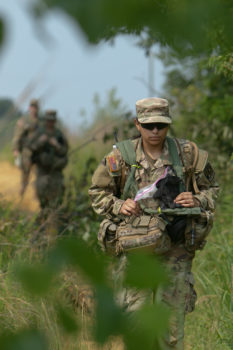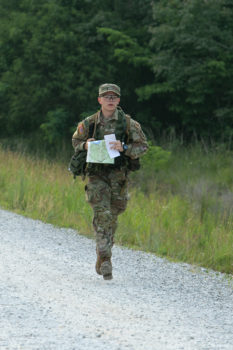FORT KNOX, Ky. – Cadets in the 2nd Regiment, Advanced Camp, take their land navigation qualification at Training Area 14, Fort Knox, Ky., June 16, 2023. Land navigation examines Cadets on their ability to read a map and navigate unfamiliar terrains.
Cadets are given a timed limit of four hours to complete their training using a map, compass, protractor, and a pencil.
Unlike other trainings that Cadets receive, they cannot rely on the help from other Cadets or communicate with each other.
“You have to have a tactical approach to land navigation,” said Spc. Kaitlyn Shulaman, Cadre leader. “You don’t have a GPS or anything really, so you have to be able to know how to mark a point and find that point on a map without using technology. Land navigation is an important skill, especially if you’re in a situation where you don’t have a GPS available. And when if say that everything goes out, how are we going to be able to mark locations, find the points, all that kind of stuff or even just addresses that kind of thing without knowing the skills of how to get there.”
An important helpful hint that Cadets are given is to rely on their 100-meter pace count as they navigate to get to their points. Many of the Cadets that go through land navigation rely on their previous knowledge and familiarities with land navigation.

“I would tell future Cadets to make sure they take care of your body because that’s what getting you through this regimen,” said Cadet Shaunna George, from The University of Mississippi. “I think I was a little nervous out there today. Obviously, it’s a it’s a big opportunity here at Camp, and it’s something that you want to get the best grade on possible. But going into the practical last night, I booked my point, so I was feeling a little bit more confident. I managed to get four out of four of my points, so I got really lucky. I think my school did a really good job of teaching us land navigation, so it definitely helped with the environment of the woods here.”
A requirement for land navigation is for Cadets to reach at least three out of the four points on the map in order to pass.
“Sometimes, you come out here, and you don’t think you’re gonna meet your points, or you think like, oh, I suck at land navigation.” said Cadet Jesse Darsey, from New Mexico State University. “So it’s gonna deter you completely from getting your points. But I think having confidence in yourself and your ability to get out there and find your points is what helps your complete land navigation strong.”
The Cadre that are present during land navigation monitor the voices and the location of Cadets through a tracking system to ensure the safety of Cadets.
Cadre leaders also drive throughout the course to make sure that Cadets do not stray from the course and that the Cadets stay hydrated as they navigate the course through the high summer temperatures.

After completing land navigation during the day, Cadets have to complete night land navigation where they are given the task of locating one out two points.
“Just come out here and do your best,” said George. “It’s literally just give it your all, and every time you think that you might not do something right or you might not do as well, just remember you have strengths and weaknesses, and the person to your left has the same or the different. Y’all come together and put everything forth and give it your best you’ll succeed.”
“Yeah, I mean, I guess the best like course was me getting four [of] four points. So coming out of that with the best course possible,” said Darsey. I’m excited to move on to nightline and see how many points I get out there, you know, challenge myself during the night because that’s a little different. It’s gonna be really hard. I think on top of the difficult terrain here, it’s very scary to be out there at night with all the noises, and I’m not from here. So the terrain is a lot different, but I’m excited to get that challenge myself and keep that same attitude.”




